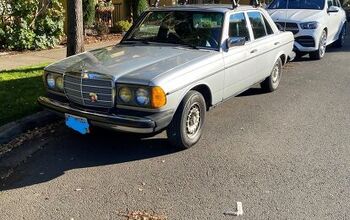Toyota Customer Retention: Breaking Up Is Hard To Do. Or Not

To the victor go the spoils. Who will be the victors, and how much spoilage will be there in the protracted Toyota battle? Of course, this is all in the name of safety and the children, and any sales dislocations will be unfortunate collateral damage. Really.
As optimistic as Toyota might want to be, over the next few months, their sales will decrease. They already do decrease. “Toyota’s US sales tumbled 16 per cent in January from a year earlier and are set to record another hefty fall this month,” reports Financial Times. Stoppage of deliveries and production, topped by a media onslaught, can have that effect.
Maybe Toyota’s ideas of an increased warranty and more incentives will work, long term, but in the short term, they’d better prepare themselves for negative numbers at the end of each month ahead.
As the first law of thermodynamics infers, energy cannot be created or destroyed, merely transposed. If customers are leaving Toyota, they don’t just disappear like Toyota‘s reputation for reliability China’s interest in US debt, they have to go somewhere. So where will they?
The price research site TrueCar.com (via FoxNews) says that the searches for the recalled Toyota models had dropped off by almost half. 25 percent of the lost traffic absconded to Ford, another 25 percent made off to Honda, whilst 20 percent hopped over to Hyundai.
The virtual spoils of war went – not surprisingly – to three marques with reputations for quality and reliability (let’s not get sidetracked by the fact that Ford announced a recall recently, as did Honda.)
TrueCar thinks their numbers are significant, because TrueCar usually gets a lot of traffic from shoppers looking to get a final run-down of the numbers as they close in on closing the deal on a new vehicle.
Competing site CarGurus.com came up with a report that found something slightly different. Like TrueCar, the Gurus found less clicking on Toyota and more on Ford. But CarGuru’s visitors did nor flirt with Honda or Hyundai. They pulled up the pages of that other pinnacle of quality and reliability, Chevrolet. Yes, CarGurus found that GM’s products were seeing increases in traffic to their brands.
Back to Financial Times. The pink sheet finds “little sign so far of a stampede to embrace” Toyota’s rivals. They cite Art Spinella, president of CNW, an Oregon-based market research group, who said: “The long-time Toyota owner considers this a pretty major issue, but the faith in the brand is still strong.”
CNW research shows that the proportion of prospective Toyota buyers who have decided to opt for another brand had fallen to 7 per cent, from 18 per cent immediately after last month’s recall of eight models with potentially faulty accelerators. Customers are a fickle bunch and prone to changing their minds for on a dime.
Weighs in Dave Cole, chairman of the Center for Automotive Research (CAR, get it?) that UAW and Detroit industry-funded mouthpiece think-tank. Cole hopes cautions that any flight from Toyota is likely to start slowly but could easily snowball. Drawing from extensive Detroit experience, Cole says: “Car owners are notoriously disloyal.”
While some armchair generals see massive desertions amongst the Toyota ranks, and some are not so sure, other analysts predict that Toyota could regain most if not all of its lost market share with a vigorous marketing campaign and reassurances on quality.
Time and most of all hard sales numbers will tell. Until then, it’s reading of green tea leaves.

More by Cammy Corrigan
Latest Car Reviews
Read moreLatest Product Reviews
Read moreRecent Comments
- Jalop1991 In a manner similar to PHEV being the correct answer, I declare RPVs to be the correct answer here.We're doing it with certain aircraft; why not with cars on the ground, using hardware and tools like Telsa's "FSD" or GM's "SuperCruise" as the base?Take the local Uber driver out of the car, and put him in a professional centralized environment from where he drives me around. The system and the individual car can have awareness as well as gates, but he's responsible for the driving.Put the tech into my car, and let me buy it as needed. I need someone else to drive me home; hit the button and voila, I've hired a driver for the moment. I don't want to drive 11 hours to my vacation spot; hire the remote pilot for that. When I get there, I have my car and he's still at his normal location, piloting cars for other people.The system would allow for driver rest period, like what's required for truckers, so I might end up with multiple people driving me to the coast. I don't care. And they don't have to be physically with me, therefore they can be way cheaper.Charge taxi-type per-mile rates. For long drives, offer per-trip rates. Offer subscriptions, including miles/hours. Whatever.(And for grins, dress the remote pilots all as Johnnie.)Start this out with big rigs. Take the trucker away from the long haul driving, and let him be there for emergencies and the short haul parts of the trip.And in a manner similar to PHEVs being discredited, I fully expect to be razzed for this brilliant idea (not unlike how Alan Kay wasn't recognized until many many years later for his Dynabook vision).
- B-BodyBuick84 Not afraid of AV's as I highly doubt they will ever be %100 viable for our roads. Stop-and-go downtown city or rush hour highway traffic? I can see that, but otherwise there's simply too many variables. Bad weather conditions, faded road lines or markings, reflective surfaces with glare, etc. There's also the issue of cultural norms. About a decade ago there was actually an online test called 'The Morality Machine' one could do online where you were in control of an AV and choose what action to take when a crash was inevitable. I think something like 2.5 million people across the world participated? For example, do you hit and most likely kill the elderly couple strolling across the crosswalk or crash the vehicle into a cement barrier and almost certainly cause the death of the vehicle occupants? What if it's a parent and child? In N. America 98% of people choose to hit the elderly couple and save themselves while in Asia, the exact opposite happened where 98% choose to hit the parent and child. Why? Cultural differences. Asia puts a lot of emphasis on respecting their elderly while N. America has a culture of 'save/ protect the children'. Are these AV's going to respect that culture? Is a VW Jetta or Buick Envision AV going to have different programming depending on whether it's sold in Canada or Taiwan? how's that going to effect legislation and legal battles when a crash inevitibly does happen? These are the true barriers to mass AV adoption, and in the 10 years since that test came out, there has been zero answers or progress on this matter. So no, I'm not afraid of AV's simply because with the exception of a few specific situations, most avenues are going to prove to be a dead-end for automakers.
- Mike Bradley Autonomous cars were developed in Silicon Valley. For new products there, the standard business plan is to put a barely-functioning product on the market right away and wait for the early-adopter customers to find the flaws. That's exactly what's happened. Detroit's plan is pretty much the opposite, but Detroit isn't developing this product. That's why dealers, for instance, haven't been trained in the cars.
- Dartman https://apnews.com/article/artificial-intelligence-fighter-jets-air-force-6a1100c96a73ca9b7f41cbd6a2753fdaAutonomous/Ai is here now. The question is implementation and acceptance.
- FreedMike If Dodge were smart - and I don't think they are - they'd spend their money refreshing and reworking the Durango (which I think is entering model year 3,221), versus going down the same "stuff 'em full of motor and give 'em cool new paint options" path. That's the approach they used with the Charger and Challenger, and both those models are dead. The Durango is still a strong product in a strong market; why not keep it fresher?

































Comments
Join the conversation
@Skid666 "I am not suggesting that everyone should stop buying Toyota and start buying Ford/GM/etc. – but they should at least do some research and be open minded when they make a new car purchase" Isn't this the difference between buying a car and buying a brand? OEMs put a whole heap of money into building up brand image for this very reason - switch off the competition in the consumer's mind by offering a promise of a consistently desireable product/ service. @Suprarush "Why hasn’t Toyota been levied a fine from NHTSA or Transport Canada or any other safety committe for thier “alleged” cover-up? Oh yes Toyota’s lining their pockets…." I think the word 'alleged' is pretty relevant here. Some might substitute with the words 'wildly accused on the basis of self interest', but I'll leave the cynicism to Cammy, who does it so well ;-)
The dynamics of this whole Toyota pedal situation are fascinating! And I don't mean the root cause of the defect. So many angles! I don't like Toyotas--they are conservative, boring, and they play to the worst tendencies of the American psyche...fat and lazy, just like Buicks used to. They're last noteworthy product was the 92-96 (gen III) Camry. Also, to their credit, they were among the first to adopt 4-valve per cylinder engines (maybe THE 1st mass producer). The original MR2 was a blast to drive. Since then, boring, coasting on that reputation. On the other hand, their manufacturing system is the envy of the world. At GM, we were trying to emulate it. Toyota's arrogance is amazing! They have only one computer that can download their black box data--give me a break! Yet, one can't avoid the conflict of interest--if GM gets some of the sales lost by Toyota, this will help move forward toward become a publicly held company again. If the govt could sell it's share, that would take a nasty election issue off the table in Nov 2010...and more importantly Nov 2012. Also, while (some of us) rejoice in the struggles of the boring car company, how will our never-satisfied Federal govt and the Obamites use this to further their power at EVERYONE's expense and make all cars more boring than the basest Corolla or Yaris? I hadn't even considered the Okinawa situation (thank Mr Carpenter above), where the Japanese govt was elected, among other things, with a pledge to 'reassess' US bases there. We want to stay, they don't really want us. We are broke anyway--maybe Obama's Secty of State can persuade the Japanese to pay to repatriate the US troops back to the US, and the brake pedal will finally 'fade' away.... In the end, I may wind up supporting Toyota against our overbearing govt--caveat emptor--buyer beware--but for now, it is interesting. And by the way, Toyota's vaunted manufacturing system is overrated, and enabled by small businesses in Japan that take up all the slack. But that's for another time.